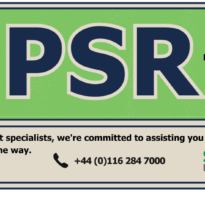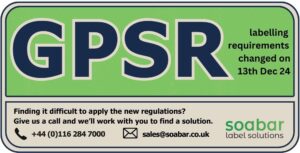What do the new GPSR changes mean for my business in 2025?
Posted on 28/01/2025 in Company News, by Emma Achurch

Since 2005, GPSR (General Product Safety Regulation) has been enforced across the EU. It applies to all non-food products that are bought and sold within all European Union member states, and aims to improve product safety standards for consumers. On 13th December 2024, a lot of changes were made to the regulation meaning that companies are having to change the way that they label their products. What does this mean for you and your business?
What do I need to know?
More products are now covered my GPSR, including those sold online that are new, used, repaired re-conditioned. In short- if you sell any product minus those in the below industries, then these new regulations apply to you & your business! In December they also enhanced market surveillance, giving more power to countries so that they can take action against non-compliant products & businesses.
An important thing to note is that these regulations only apply to products launched after the 14th December. Say, for example, you have been selling a product in the EU since the start of 2023, these new regulation changes don’t apply to that particular product line. However if you’ve tweaked that range or launched a new range entirely, and these products started to be sold on 20th December 2024 in EU countries, then these regulations need to be enforced.
The following industries and products are exempt from the GPSR:
- Medicinal products for human or veterinary use
- Food and feed
- Living plants and animals, genetically modified organisms and microorganisms in contained use
- Animal-derived and by-products
- Plant protection products
- Transport equipment operated by a service provider
- Low-risk aircraft
- Antiques
- Products clearly marked to be repaired or reconditioned prior to use
What do I have to do?
Other than ensuring that products are safe by design by carrying out internal risk assessments and drawing up documentation for this, you’ll need to make sure that product safety and traceability information is provided on all products or their packaging.
Somewhere on your product you need to include age suitability, warnings, disposal information and instructions for safe use. This is usually printed onto a label. Additionally, in accordance with Article 22 of the GPSR, safety information needs to be written in official languages of the EU countries where the product is being sold, so it can be easily understood. So, you need to look at where your product is being sold, and ensure that safety information is printed in all of those languages.
From our understanding of the new regulations so far, languages are often selected from the 6 widely spoken European languages (German, French, Italian, English, Spanish and Polish) which are commonly spoken languages in a lot of EU member states. However, if you know that your product is going to be sold largely in Greece, for example, it will be crucial that you print the required information in Greek also.
What happens if I don’t comply?
If you don’t provide this information, then your products could be subject to recalls. Countries and the European Commission have the power to prohibit, restrict and suspend the sale of products, and enforce special conditions for marketing your products in the future.
Next Steps
If you know that you have a new product range being released shortly, or it was released after December 13th 2024, then contact your label supplier who can help to re-design you label to include all of the required information.
Alternatively, feel free give us a call and we’ll happily work with you to help you to understand what these regulations mean specifically for your business. We’ll support you in coming up with a simple, effective labelling solution for your products, that don’t compromise their aesthetics or shelf-appeal.
Please note that this post is a summary of the GPSR and the latest changes, to the best of our knowledge. To read the full set of regulations, then please click here.


